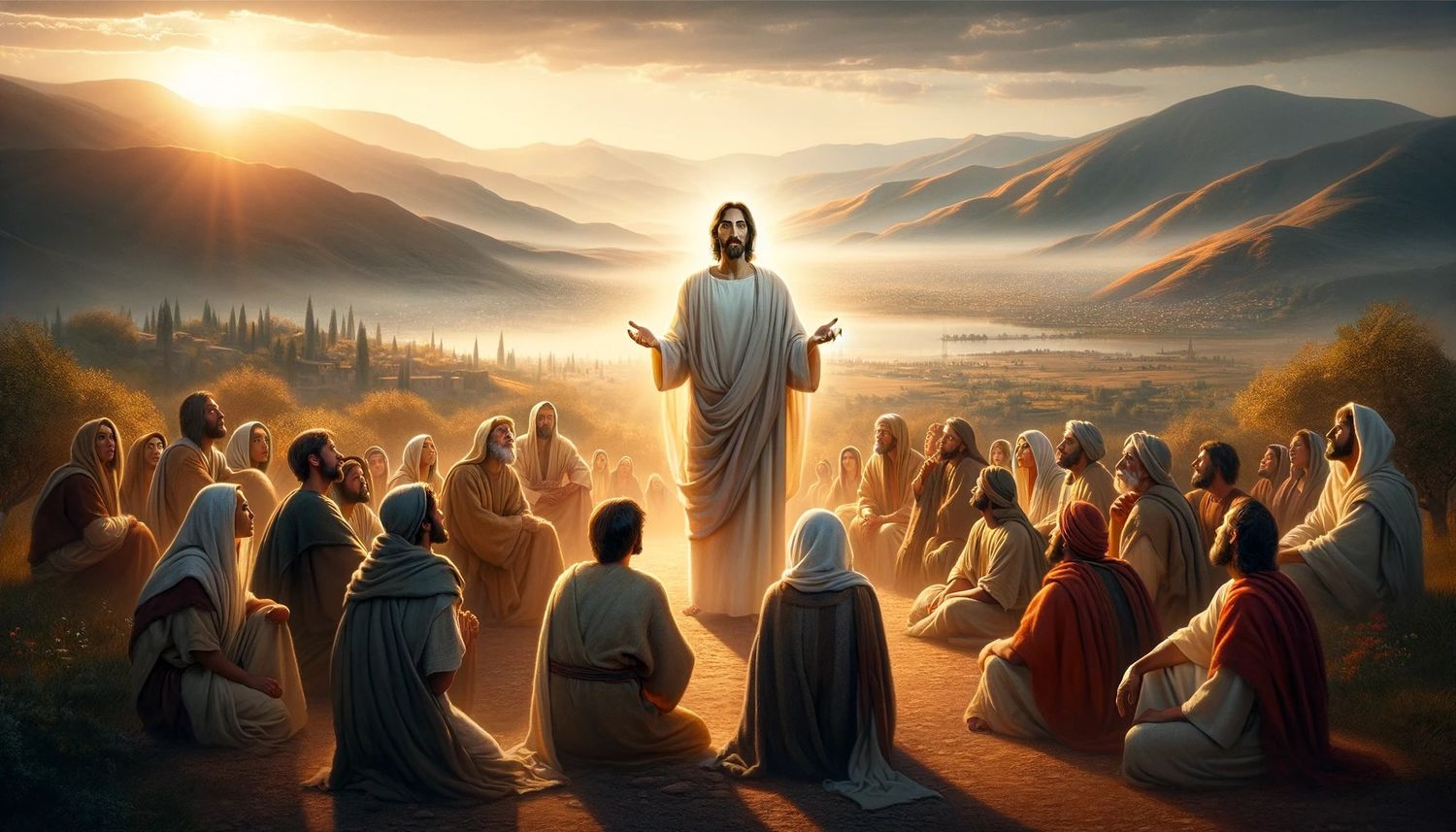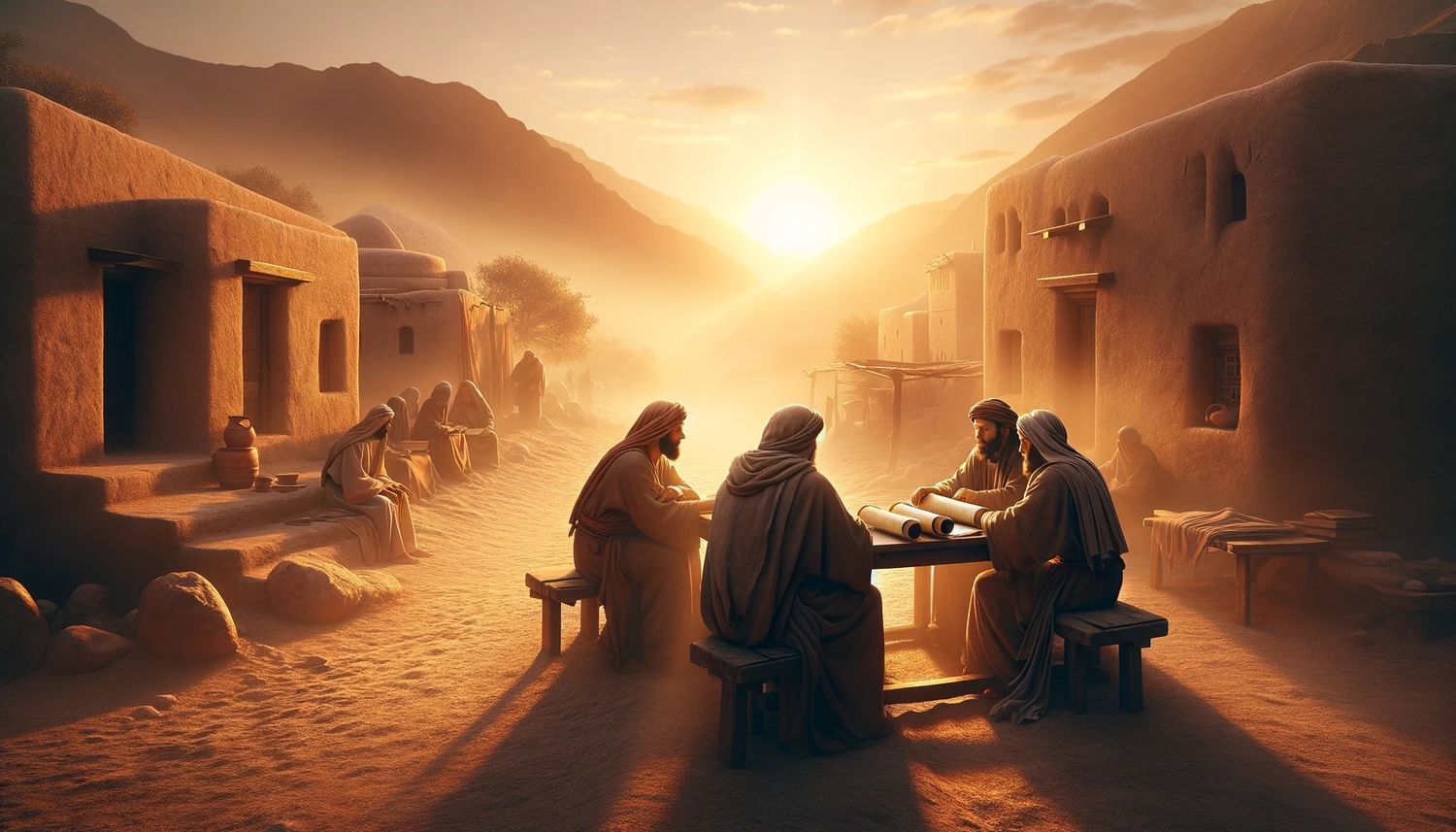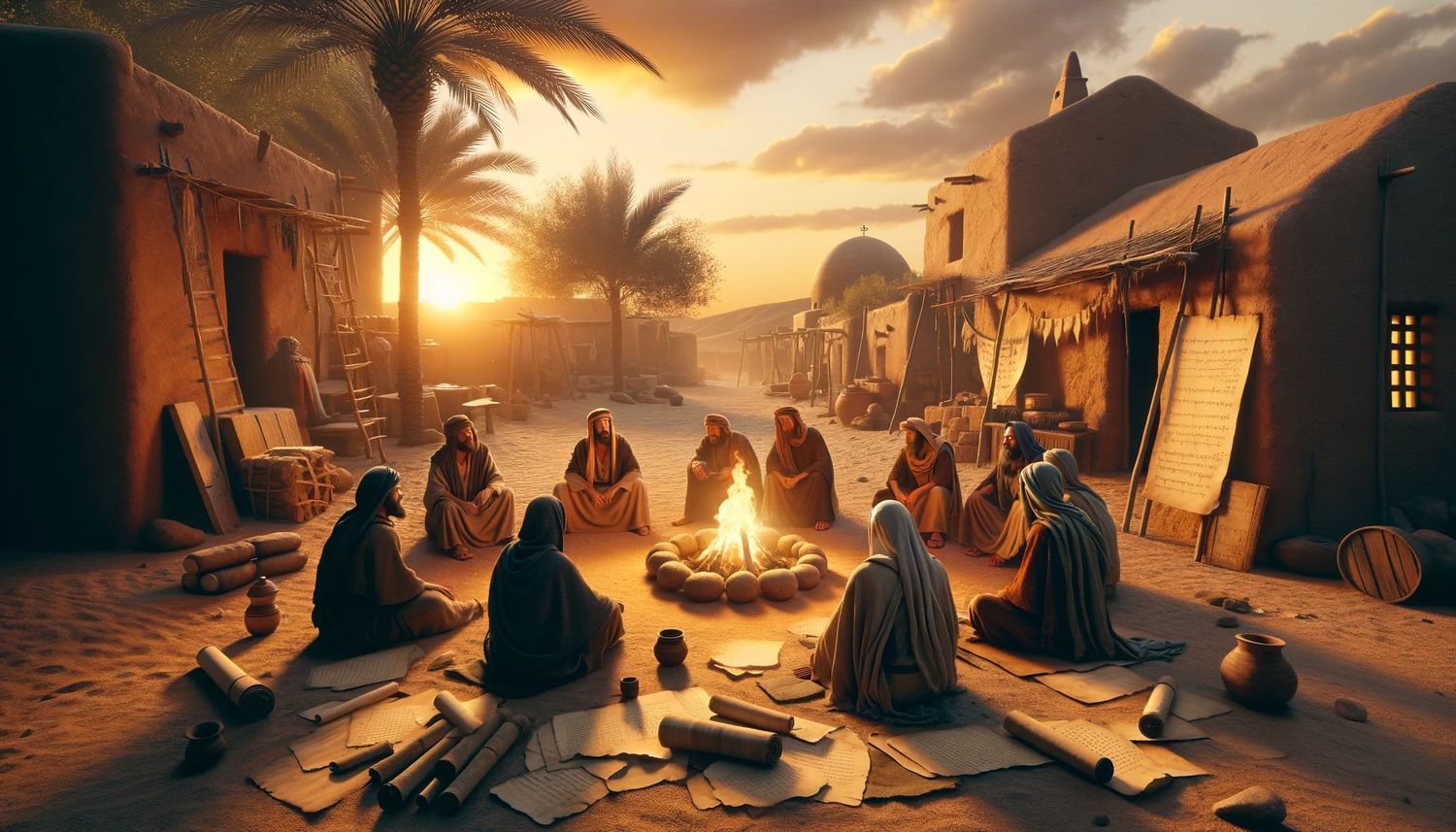Home>Christian Videos>Bible Stories>How The Synoptic Gospels View The Kingdom Of God Commentary


Bible Stories
How The Synoptic Gospels View The Kingdom Of God Commentary
Published: March 6, 2024
Peter Smith, Editorial Director at Christian.net, combines deep insights into faith, politics, and culture to lead content creation that resonates widely. Awarded for his contributions to religious discourse, he previously headed a major organization for religious communicators, enhancing dialogue on faith's societal impacts.
Explore the perspectives of the Synoptic Gospels on the Kingdom of God in this insightful commentary. Gain a deeper understanding of these biblical stories.
(Many of the links in this article redirect to a specific reviewed product. Your purchase of these products through affiliate links helps to generate commission for Christian.net, at no extra cost. Learn more)
Table of Contents
Introduction
What is the Kingdom of God, and how is it portrayed in the Synoptic Gospels? The concept of the Kingdom of God is central to the teachings of Jesus Christ, and it is a recurring theme in the Synoptic Gospels of Matthew, Mark, and Luke. Each of these Gospels offers a unique perspective on the nature and significance of the Kingdom of God, providing valuable insights into the religious and cultural context of the time. In this article, we will explore how the Synoptic Gospels view the Kingdom of God, shedding light on the diverse interpretations and implications of this fundamental concept in Christian theology.
The Kingdom of God in the Gospel of Matthew
-
The Kingdom of God as a Present Reality: In the Gospel of Matthew, the Kingdom of God is depicted as a present reality that is accessible to believers. Jesus emphasizes the immediacy of the Kingdom and invites his followers to embrace it wholeheartedly. This is evident in the Beatitudes, where Jesus proclaims, "Blessed are the poor in spirit, for theirs is the kingdom of heaven" (Matthew 5:3). The emphasis on the present availability of the Kingdom underscores the transformative power of faith and the spiritual fulfillment it brings to individuals.
-
Parables and Teachings: Matthew's Gospel contains numerous parables and teachings of Jesus that illustrate the nature of the Kingdom of God. The parable of the mustard seed and the leaven (Matthew 13:31-33) highlights the Kingdom's growth and pervasive influence. Additionally, the parable of the wheat and the tares (Matthew 13:24-30) underscores the coexistence of good and evil within the Kingdom, emphasizing the ultimate judgment and separation. Through these parables, Matthew presents a vivid portrayal of the Kingdom's dynamic and inclusive nature.
-
The Great Commission: The Gospel of Matthew concludes with the Great Commission, where Jesus instructs his disciples to go and make disciples of all nations, baptizing them in the name of the Father, the Son, and the Holy Spirit (Matthew 28:19-20). This commission reflects the universal scope of the Kingdom of God, transcending cultural and geographical boundaries. It underscores the missionary imperative to spread the message of the Kingdom to all corners of the earth, emphasizing its inclusive and transformative impact on humanity.
-
The Kingdom and Righteousness: Matthew's Gospel intertwines the concept of the Kingdom of God with the pursuit of righteousness. Jesus exhorts his followers to seek first the Kingdom of God and His righteousness, assuring them that all their needs will be provided (Matthew 6:33). This linkage underscores the ethical and moral dimensions of the Kingdom, emphasizing the alignment of one's life with the divine will as a prerequisite for entering and experiencing the Kingdom's blessings.
-
The Kingdom and Judgment: In Matthew's Gospel, the Kingdom of God is associated with the theme of judgment and accountability. The parables of the ten virgins (Matthew 25:1-13) and the sheep and the goats (Matthew 25:31-46) underscore the eschatological dimension of the Kingdom, highlighting the ultimate reckoning and separation of the righteous and the unrighteous. These parables serve as a sobering reminder of the Kingdom's ultimate fulfillment and the moral responsibility incumbent upon its participants.
In the Gospel of Matthew, the Kingdom of God is portrayed as a present reality with transformative power, characterized by inclusivity, righteousness, and eschatological judgment. Jesus' teachings and parables in Matthew's Gospel provide a rich tapestry of insights into the nature and implications of the Kingdom, offering a compelling vision of divine sovereignty and human participation.
The Kingdom of God in the Gospel of Mark
-
Immediacy and Power: In the Gospel of Mark, the Kingdom of God is portrayed as a force of immediate and transformative power. Mark emphasizes the urgency of embracing the Kingdom, as seen in Jesus' proclamation, "The time is fulfilled, and the kingdom of God is at hand; repent and believe in the gospel" (Mark 1:15). This sense of immediacy underscores the radical nature of the Kingdom's arrival and its capacity to bring about profound spiritual renewal and liberation.
-
Authority and Demonstration: Mark's Gospel vividly depicts Jesus' authority over the forces of darkness and his demonstration of the Kingdom's power through miraculous deeds. The exorcisms, healings, and nature miracles performed by Jesus serve as tangible manifestations of the Kingdom's presence and its capacity to overcome evil and suffering. These demonstrations of authority underscore the Kingdom's divine origin and its redemptive impact on individuals and the created order.
-
Parables and Mysteries: Mark's Gospel includes several parables that shed light on the nature and dynamics of the Kingdom of God. The parable of the growing seed (Mark 4:26-29) and the parable of the mustard seed (Mark 4:30-32) emphasize the organic growth and pervasive influence of the Kingdom, highlighting its mysterious and transformative nature. These parables invite the audience to contemplate the hidden yet potent workings of the Kingdom, challenging them to discern its presence and respond with faith and receptivity.
-
Suffering and Servanthood: Mark's portrayal of the Kingdom of God intertwines the themes of suffering and servanthood. Jesus' teachings on servanthood and self-sacrifice (Mark 10:42-45) exemplify the paradoxical nature of the Kingdom, where greatness is found in humility and service. The suffering and crucifixion of Jesus are presented as integral to the inauguration of the Kingdom, emphasizing the redemptive and sacrificial dimensions of its establishment.
-
Eschatological Fulfillment: Mark's Gospel also addresses the eschatological dimension of the Kingdom of God, pointing towards its ultimate consummation and fulfillment. The apocalyptic discourse in Mark 13 underscores the anticipation of the Kingdom's final revelation and the need for vigilance and readiness. This eschatological perspective highlights the tension between the present manifestation of the Kingdom and its future culmination, calling for faithful endurance and hope amidst trials and tribulations.
In the Gospel of Mark, the Kingdom of God is depicted as a powerful and enigmatic reality, characterized by immediacy, authority, mystery, suffering, and eschatological anticipation. Mark's narrative invites readers to encounter the dynamic and transformative presence of the Kingdom in the person of Jesus Christ, compelling them to respond with faith, humility, and expectant hope.
The Kingdom of God in the Gospel of Luke
-
Emphasis on Social Justice and Inclusivity: The Gospel of Luke presents the Kingdom of God as a realm characterized by social justice, compassion, and inclusivity. Luke's narrative highlights Jesus' concern for the marginalized and oppressed, portraying the Kingdom as a space where the poor, the outcasts, and the marginalized find dignity and belonging. The Beatitudes in Luke 6:20-26 underscore the reversal of fortunes within the Kingdom, where the disadvantaged are uplifted, and the privileged are called to account. This emphasis on social justice aligns with Luke's overarching theme of God's concern for the downtrodden and His desire to establish a community marked by equity and compassion.
-
Parables of Mercy and Restoration: The Gospel of Luke features distinctive parables that illuminate the nature of the Kingdom of God. The parables of the Good Samaritan (Luke 10:25-37) and the Prodigal Son (Luke 15:11-32) emphasize the themes of mercy, reconciliation, and restoration within the Kingdom. These parables depict the Kingdom as a realm of radical forgiveness and transformative grace, where barriers of prejudice and resentment are dismantled, and reconciliation is extended to all who seek it. Luke's portrayal of the Kingdom through these parables underscores its redemptive and restorative dimensions, inviting individuals to participate in God's reconciling work.
-
Healing and Wholeness: In the Gospel of Luke, the Kingdom of God is intimately linked to the themes of healing and wholeness. Jesus' ministry of healing the sick, restoring sight to the blind, and liberating the oppressed serves as tangible demonstrations of the Kingdom's power to bring about physical, emotional, and spiritual wholeness. The healing narratives in Luke underscore the Kingdom's capacity to address human brokenness and to usher in a reality where suffering and affliction are ultimately overcome. This emphasis on healing aligns with Luke's portrayal of Jesus as the compassionate healer and the embodiment of God's redemptive love.
-
Radical Hospitality and Table Fellowship: Luke's Gospel portrays the Kingdom of God as a space of radical hospitality and inclusive table fellowship. Jesus' interactions with tax collectors, sinners, and social outcasts highlight the Kingdom's invitation to all, irrespective of their social status or past transgressions. The imagery of the banquet in Luke 14:15-24 underscores the expansive and inclusive nature of the Kingdom, where individuals from all walks of life are welcomed to partake in the divine feast. This emphasis on radical hospitality reflects the Kingdom's capacity to transcend societal barriers and to create a community of mutual acceptance and celebration.
-
Eschatological Hope and Fulfillment: Luke's Gospel also addresses the eschatological dimension of the Kingdom of God, pointing towards its ultimate consummation and fulfillment. The anticipation of the Kingdom's final revelation and the inauguration of God's reign in its fullness permeates Luke's narrative, fostering a sense of eschatological hope and expectancy. The parables of the persistent widow (Luke 18:1-8) and the coming of the Son of Man (Luke 21:25-28) underscore the need for steadfast faith and readiness in light of the Kingdom's ultimate realization. This eschatological perspective invites believers to live in hopeful anticipation of the Kingdom's ultimate triumph and the restoration of all things.
In the Gospel of Luke, the Kingdom of God is portrayed as a realm of social justice, mercy, healing, hospitality, and eschatological hope. Luke's narrative presents a compelling vision of the Kingdom as a transformative and inclusive reality, inviting individuals to participate in God's redemptive work and to embody the values of the Kingdom in their lives.
A Comparative Analysis of the Synoptic Gospels' Views on the Kingdom of God
When comparing the Synoptic Gospels' perspectives on the Kingdom of God, it becomes evident that while they share common themes, each Gospel presents unique emphases and nuances in its portrayal of the Kingdom. Matthew, Mark, and Luke offer distinct lenses through which the nature, dynamics, and implications of the Kingdom are articulated, enriching the readers' understanding of this fundamental concept in Christian theology.
Read more: How Did God Speak In The Gospels
Common Themes
Despite their distinctiveness, the Synoptic Gospels converge on several fundamental themes related to the Kingdom of God:
-
Immediacy and Accessibility: All three Gospels underscore the immediacy and accessibility of the Kingdom, emphasizing its presence as a transformative reality that demands a response from individuals. Whether through parables, teachings, or miraculous demonstrations, the Gospels convey the urgency of embracing the Kingdom and aligning one's life with its values and principles.
-
Inclusivity and Social Justice: The Gospels collectively highlight the inclusive nature of the Kingdom, portraying it as a realm where social hierarchies are challenged, and the marginalized find dignity and belonging. The Kingdom's concern for the oppressed, the poor, and the outcasts is a recurring motif, reflecting God's impartial love and His desire to establish a community marked by justice and compassion.
-
Eschatological Fulfillment: Each Gospel addresses the eschatological dimension of the Kingdom, pointing towards its ultimate consummation and the restoration of all things. The tension between the present manifestation of the Kingdom and its future culmination is a shared emphasis, fostering a sense of hopeful expectancy and the need for steadfast faith amidst trials and tribulations.
Unique Emphases
While the Synoptic Gospels converge on common themes, they also exhibit distinctive emphases in their portrayal of the Kingdom:
-
Matthew's Emphasis on Righteousness and Judgment: The Gospel of Matthew intertwines the concept of the Kingdom of God with the pursuit of righteousness and ethical living. Matthew's portrayal emphasizes the moral dimensions of the Kingdom, highlighting the linkage between righteousness and participation in the Kingdom's blessings. Additionally, Matthew accentuates the theme of judgment and accountability within the context of the Kingdom, underscoring the ultimate reckoning and separation of the righteous and the unrighteous.
-
Mark's Emphasis on Power and Mystery: Mark's Gospel emphasizes the immediate and transformative power of the Kingdom, vividly portraying Jesus' authority over the forces of darkness and his demonstration of the Kingdom's potency through miraculous deeds. Mark's narrative also accentuates the mysterious and enigmatic nature of the Kingdom, inviting readers to contemplate its hidden yet pervasive workings and to respond with faith and receptivity.
-
Luke's Emphasis on Mercy and Social Reversal: The Gospel of Luke places a distinctive emphasis on mercy, reconciliation, and social reversal within the Kingdom. Luke's portrayal highlights the Kingdom as a realm of radical forgiveness and restoration, where barriers are dismantled, and reconciliation is extended to all who seek it. Additionally, Luke underscores the Kingdom's concern for the marginalized and its capacity to bring about social reversal, where the disadvantaged are uplifted, and the privileged are called to account.
In essence, the Synoptic Gospels offer a rich tapestry of perspectives on the Kingdom of God, each contributing unique insights and emphases to the overall portrayal of this central theme in Christian faith. The diverse nuances and common threads woven through Matthew, Mark, and Luke's narratives collectively enrich the readers' comprehension of the Kingdom's nature, significance, and implications, inviting them to engage with its transformative message in a multifaceted manner.
Conclusion
In conclusion, the Synoptic Gospels of Matthew, Mark, and Luke offer diverse yet complementary perspectives on the Kingdom of God, enriching the readers' understanding of this fundamental concept in Christian theology. Each Gospel presents a unique lens through which the nature, dynamics, and implications of the Kingdom are articulated, providing valuable insights into its transformative power, ethical dimensions, and eschatological fulfillment. While the Gospels converge on common themes such as immediacy, inclusivity, and eschatological hope, they also exhibit distinctive emphases in their portrayal of the Kingdom, reflecting the multifaceted nature of this central theme in Christian faith. The rich tapestry of perspectives woven through Matthew, Mark, and Luke's narratives invites readers to engage with the Kingdom's transformative message in a multifaceted manner, fostering a deeper appreciation for its significance in the religious and cultural context of the time.














